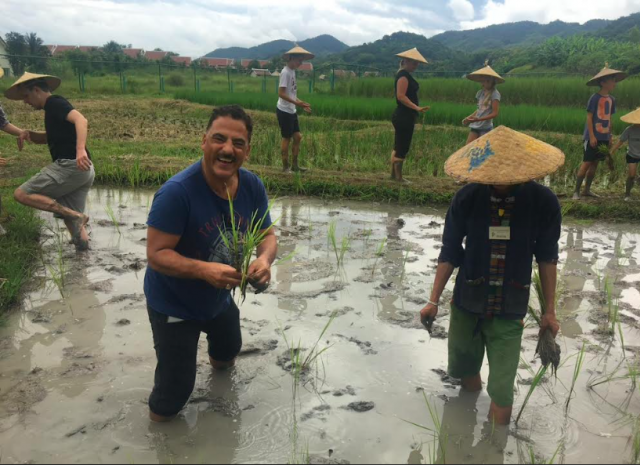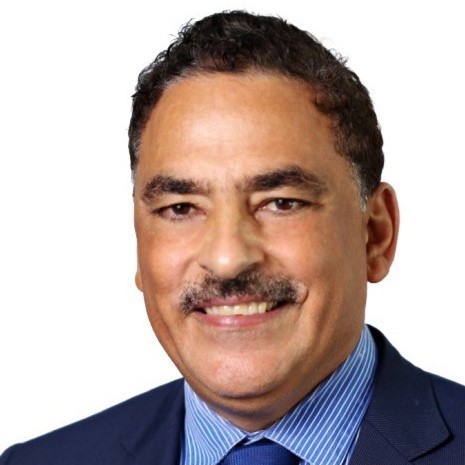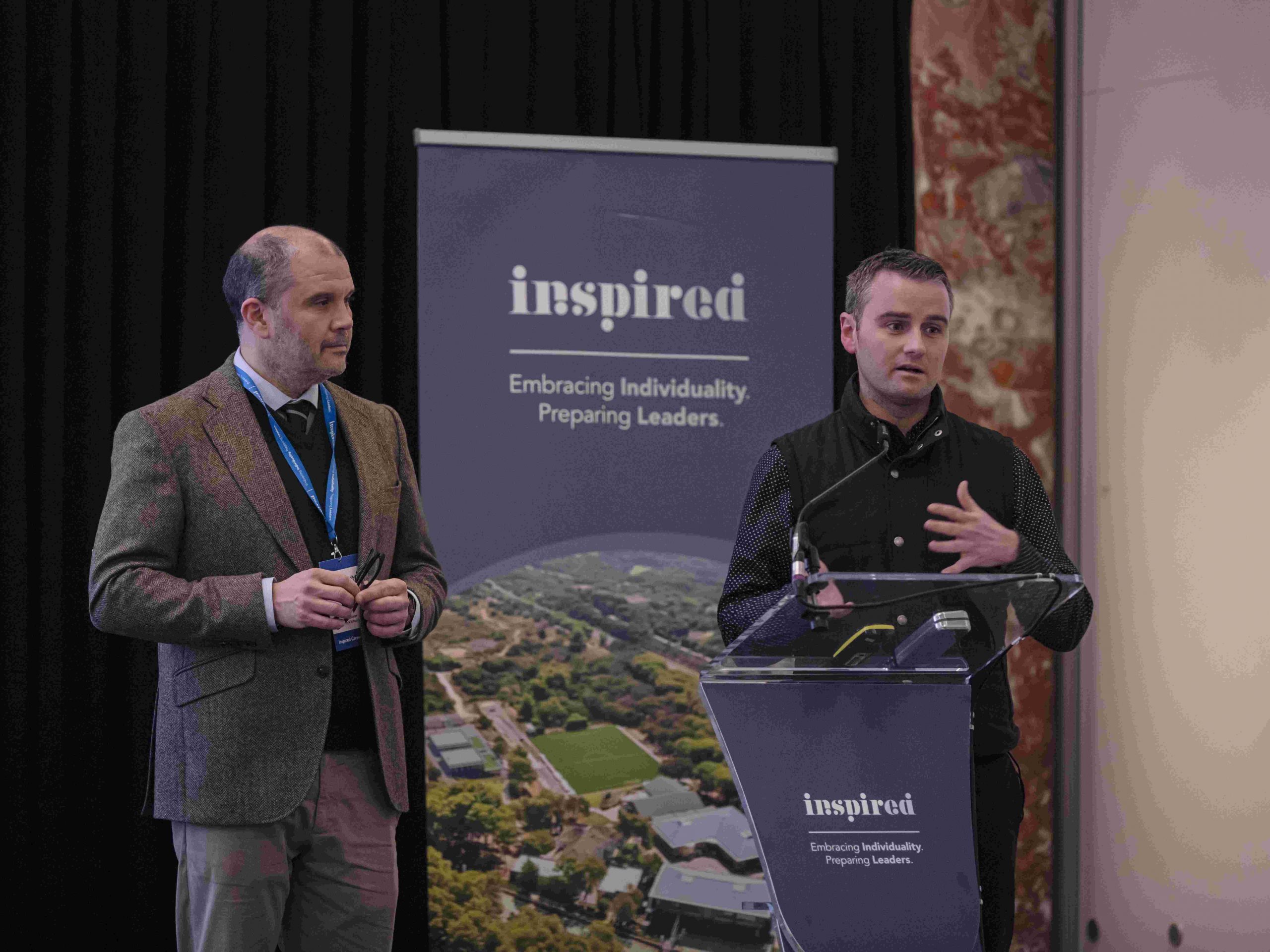From teaching fractions in a supply classroom in Leicestershire to leading international schools across the globe, Tassos Anastasiades has built a career grounded in purpose, resilience, and a deep belief in the transformative power of education. His journey has taken him from the UK to Cyprus, the UAE, and now Bahrain, where he continues to lead with vision and heart – always focused on nurturing potential in students and staff alike. In this interview, Tassos shares the pivotal moments, values, and lessons that have shaped his career – and the vision that drives him forward today.
1. What has brought you to this moment? We would love a short life story.
This is an amazing question because it reflects what’s been a long and meaningful journey for me.
After completing my research and doctorate many years ago in the UK, I unexpectedly found myself stepping into teaching. I started doing supply work, covering classes in Leicestershire, and one of my first experiences was teaching a low-ability maths class while I was still working on my PhD. I was teaching fractions, and to be honest, I couldn’t even remember them properly at the time! But the students helped me out, and the whole experience was incredibly rewarding.
Other teachers had warned me that it was a tough class, but I absolutely loved it. I think that moment really hooked me, and that’s what drew me into the world of education.
From the start, my passion has always been rooted in the belief that every child has a gift and deserves an outstanding education, regardless of their background or culture. That belief has driven everything I’ve done. I’ve always tried to inspire young people to reach their full potential – to help them recognise and develop their own gifts.
That mindset has also shaped how I lead staff. I’ve been fortunate enough to grow in my career and support many colleagues in their development. In fact, just a few minutes ago, my son called me about a job interview. He’s applying for a drama position, and he told me, “You’ll never guess who interviewed me – Matthew Barrett from Raffles!” I was stunned. Years ago, I had mentored Matthew when I was working on quality assurance across four schools in the UAE. I spotted his potential early on and recommended him for a leadership role. I coached him for three years as Head of Department. Now he’s a principal. It’s incredibly fulfilling to see that kind of long-term impact.
These moments mean a lot. They remind you of the importance of the work you’ve done, not just in the classroom, but in people’s lives.
I am now working with New Generation School in Bahrain. We’ve got 470 students, and we’re working on implementing the IB – both the MYP and DP. Honestly, it’s not about the salary, I’m here because I want to give back and use my experience to make a difference.
At the same time, I’m thinking ahead. After such a long and fulfilling career, I’m looking at what’s next. I want to develop an enterprise that brings passionate professionals together to support one another and give back globally.

2. What has inspired you along the way? Whether people, places or experiences?
I think both my wife and I have always shared a deep love for internationalism, globalism, and, in a way, a spiritual calling – our love of God and humanity. That’s been a strong, guiding force in my life.
To be honest, after many years teaching in the UK, I found it uninspiring. It got to the point where I felt I was going downhill professionally. I still loved teaching, but the environment, the Ofsted inspections, the constant pressure, and the negativity was just too much. It made me seriously consider leaving the profession altogether, which was heartbreaking.
So we made a bold decision. We left teaching in the UK and took a job in Cyprus. I was earning the equivalent of just £300 a month, but I didn’t care – I needed a fresh start. That risk turned out to be one of the best decisions we’ve ever made. Suddenly, I rediscovered my love for teaching. I realised children do want to learn and you can teach effectively without being suffocated by bureaucracy.
Even though the salary was low, we learned how to live more purposefully. The quality of life and the joy of teaching far outweighed the high stress and rigid systems we’d experienced in the UK. That move marked the beginning of our international journey.
Since then, we’ve moved around quite a bit. I’m often asked in interviews, “Why have you changed schools every few years – two, three, five years?” But honestly, I don’t see that as a negative. I still believe it’s not about how long you stay in a school, but about the impact you make while you’re there.
If you can bring value to a school, develop leaders, raise standards, leave systems in place that last, then your time there has been meaningful. In fact, when I left my role in the UAE after three years working across four schools on quality assurance, the systems and frameworks we built were so solid that they’re still being used today.
That’s what inspires me: leaving a legacy. Making a lasting difference.
More recently, I’ve gravitated toward the International Baccalaureate, particularly the MYP. I find it much more aligned with my values – less bureaucracy, less exam-driven pressure, and a stronger focus on collaboration, inquiry, and holistic education. It’s about coaching students and working as a team to bring out the best in each individual.
On a broader level, I’ve been deeply affected by the way politics, especially recent discussions around immigration, have shifted in some parts of the world. That narrative goes completely against what I believe in. I believe in teaching all children, from all cultures and backgrounds. The idea that someone “doesn’t belong” because they’re an immigrant contradicts everything I stand for.
We live in a globalized world, and as educators, we have a responsibility to nurture that understanding. That belief continues to inspire me every day.

3. What are you proud to have achieved in your current school?
One of the things I’m most proud of actually stems from my time working with a group of four schools in Dubai. There were significant challenges when I first joined in a school improvement and quality assurance role. At the time, one of the schools was rated as “Acceptable,” while the others were rated “Good” in terms of teaching and learning.
My role was to lead the schools towards higher inspection ratings and, ideally, to help at least one of them achieve “Outstanding.” To do that, I really had to dig deep into the quality of teaching and learning. I’ve always believed that this is the foundation. If you understand what makes teaching and learning truly effective in the classroom, then everything else follows – leadership development, curriculum design, and ultimately, student progress.
We began by revising the school vision to focus on innovation and inquiry-based learning. We moved away from a rigid testing culture and instead encouraged a broader view of evidence of learning. While we still used external benchmark assessments like GL, CAT4, and NGRT to validate progress, the emphasis was placed on students demonstrating learning in more meaningful ways.
We also developed a model of “leaders of learning.” These were teachers who assessed themselves and their peers against clear criteria, not inspection-focused, but based on professional standards of excellence. As they grew, they mentored others, and this created a ripple effect throughout the schools.
The results were remarkable. At Dubai International Academy, for example, we went from 20% of teaching being rated below “Good,” to 70% of teaching rated as “Outstanding” – all within three years.
We implemented strategies like learning ladders, which helped map student progress in a visible, structured way.
By the end of that three-year period, Dubai International Academy had reached a “Very Good” rating and was eventually rated “Outstanding” in the inspection just after I left. The Collegiate American School achieved “Good,” and all the schools in the group were rated at least “Good” or better.
4. How did you come to choose your current school?
In many ways, because of my age, I didn’t really choose it. I was finding it difficult to get any positions. So during that time, I spent a while in Cyprus, working on my website and career plans, setting up some consultancy work.
I don’t have a publicist or anything like that, but I was actually headhunted by the director here. He had seen my CV and contacted me. The first thing he said was, “I know you’re going to be disappointed with any kind of salary or remuneration,” but he shared his vision. He told me it was a school with heart, a place that really wants to do well, and he was looking for someone to help lead it.
So I discussed it with my wife. Bahrain – that’s where I started my career 30 years ago, at St. Christopher’s. It was incredible: 30 years to the day since we were last at St. Christopher’s, where I was Head of Biology. So, in many ways, it was an easy decision to come back. And honestly, we made the right one.

5. What is your vision for your time at your current school?
I’ve done a lot already, so things are moving quite quickly. We started with the vision, which we developed collaboratively: Inspire to learn, to innovate, lead to empowerment. That’s now something the students recite every day: Inspire to learn, to innovate, lead to evolve. It’s everywhere throughout the school.
We then defined the educational vision: high-quality teaching and learning, with an enquiry-based approach. We included values like critical thinking and self-directed learning, and created a clear mission statement. We also identified our core values: compassion, leadership, adaptability, innovation and creativity.
We did all of this together as a team. From there, we began to monitor and support our teachers, especially because we’re a low-budget school, and many teachers need additional support.
So in the first two months, it was almost a top-down leadership approach. We had to clearly communicate expectations. Despite being low-budget, we set high standards: clear whiteboard rules, structured lesson starts, visible objectives. We introduced daily reading time ‘Drop Everything and Read’ to help students build literacy.
We also emphasised collaborative learning and gave teachers practical strategies, like ‘Think-Pair-Share’. The focus has really been on high-quality teaching and learning.
We’ve started developing our “leaders of learning” – teachers who’ve never held leadership roles before. We introduced observations using specific criteria. It’s been a tough journey, but what I’ve learned is that regardless of background or experience, the teachers who are open and have a positive attitude can develop very quickly.
We’ve seen real growth among those teachers, and it’s encouraging.
Now, our vision includes becoming a full IB school. Right now we have about 470 students, and over the next two to three years, I see us becoming a fully-fledged IB school, potentially competing with the likes of St. Christopher’s and other leading schools in Bahrain. Even as a low-budget school with around 50 nationalities, I believe we have the potential.
To meet inspection standards, consistency is key. In parallel to all this, I’ve just completed my inspector qualification, which allows me to inspect schools.
6. What are your values and how would you describe your leadership style?
My media channel focuses heavily on supporting and developing leaders. I strongly believe that everyone has the potential to be a leader. That belief really shapes my approach.
My leadership style is rooted in coaching. I recently completed a course in consultative psychology and solution-based psychology, both of which align very well with how I work. I’m also currently studying NLP. So my approach is quite similar to that of a consultative psychologist – helping people build on their existing skills, empowering them to develop, and supporting their growth in self-confidence and self-esteem as they step into leadership roles.

A big part of that is helping people let go of past baggage so they can move forward. When teachers are able to do that, regardless of their qualifications or background, I’ve seen significant personal and professional growth. Some of the best leaders I’ve worked with haven’t necessarily had the highest qualifications, but they’ve had the right mindset and attitude. I try not to judge based on qualifications alone; my approach is far more personal and collaborative.
Of course, structure is still important. I do ask for evidence and clear documentation, which is why I might send formal emails to set expectations and establish a framework. But I always follow that up by walking around, talking to people, and offering support. That one-to-one connection is vital. I’ll say, “Here’s what we’re trying to do, and here’s where we’re hoping to be next week.”
This approach has been especially important in our current context, where many of our teachers have limited experience in formal education settings.
So yes, you need strong leadership – but more importantly, you need people leadership.
7. What is your vision for the future of education?
We’re now living in an age of what I call digital distraction. Who isn’t distracted by their mobile phone, social media, Facebook, Instagram, TikTok – or Threads? It’s everywhere.
And now, we have AI. I’d say we’ve become AI-fied. We all know we can use AI to find out just about anything, and it’s becoming embedded in our cultural mindset. I see it with people around me – my wife, for instance. Instead of having a longer conversation or working something out together, it’s, “Let’s just look it up.” We all do it. “What’s the cause of this vitamin deficiency?” – and within seconds, we have an answer.
So now we’ve got both digital distraction and AI, and that presents real challenges for education. It used to be about “bring your own device,” and we welcomed that. But now, it’s becoming a concern. Students know how to manipulate their devices using tools like Copilot or Gemini. They can get instant answers, have essays written for them in seconds, and that’s not going away. If anything, it’s only going to increase. The progress just in the last few months has been phenomenal.

For example, if I’m preparing an MYP lesson for Year 6, 7, or 8, I can ask Gemini to generate something for me and, in microseconds, it’s done. If I want it slightly changed, I can request that, and it will instantly update the content. That’s the reality now and it’s here to stay.
So the real question is: how will education adapt? The old model of teaching from the front of the classroom no longer works. Attention spans have shrunk, not just for students, but for teachers too. You start speaking, and within ten seconds, you’ve lost some of the class. It used to be that you had three to five minutes to get your point across. Now, it’s seconds.
That means teaching has to change. It needs to shift towards high-quality, interactive learning focused on deep questioning and engagement. For example, I walked into a Year 1 class this morning. They were discussing who was cooler: someone in shorts and a T-shirt or someone with an umbrella. Same environment, but different approaches. There was a lot of discussion, but when it came to deeper thinking, what sunlight is, how waves work, they struggled. They’re so used to just looking it up that deeper cognitive processing doesn’t happen naturally.
That’s where real learning needs to take place, when you get students to think on their feet, ask deeper questions, and keep asking. That’s what fosters critical thinking and cognitive retention. Otherwise, we risk a future where students don’t actually need to think because everything is instantly available to them.
So the whole concept of teaching and learning has to change in a way that ensures students still learn, not just consume information.
8. What is the best and perhaps worst advice you have received?
The best advice I ever received was when I got my first job as a principal. I was at St. Christopher’s in Cyprus at the time, and there was a gentleman from Egypt who trusted me and offered me the role of leading the American Academy – my first principal position.
The advice he gave me was all about expectations and standards. He told me that as a leader, you must be absolutely clear about your expectations and standards – and not compromise on them.
He was particularly passionate about performing arts and school productions. I remember how he insisted that everything had to be of the highest standard – from the displays on the walls to the way students performed. Everything had to be impeccable. Everyone had to be standing tall, delivering their best. It was truly outstanding.
That message stayed with me: the importance of holding on to your own outstanding expectations and ensuring that others rise to meet them. I’ve carried that value with me throughout my career – the belief that setting and maintaining high expectations for everyone is not just important, it’s essential.
9. What are your areas of expertise and do you have any passion projects?
I have several passion projects, such as running Education Speaks, working in recruitment consultancy, and developing leaders. You’ll see all the different areas highlighted on my website. I’m also involved in inspecting CIS accreditations. I have many areas of expertise: teaching, science, biology – a bit of everything, really.
I’ve worked in about 11 countries, so I bring a broad and diverse perspective.

10. How has your experience been with Teacher Horizons?
I’ve known Teacher Horizons since they first started, many years ago. They’ve helped me with a few jobs over the years.
What really stood out to me was how personal the experience was. It was unbelievable, honestly. I had used all the major recruitment agencies, but when Teacher Horizons came along the service they provided was completely different.
The advisors genuinely cared and really helped you to find the right job. It felt very unique and rare at the time, and to be honest, it still is.
To learn more about Tassos’ work and connect, you can reach out to him via LinkedIn.




